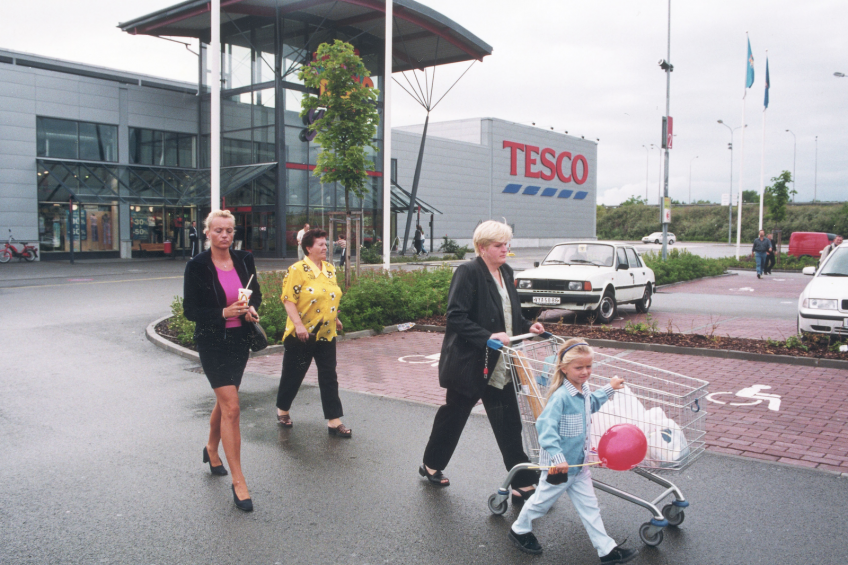British poultry industry alarmed by cage-eggs ban

It started with a petition by a 13-year-old schoolgirl from Sheffield, who wasn’t happy that Tesco, the biggest supermarket in Great-Britain, was still selling eggs from cage-hens. In no time, she collected over 200,000 signatures, forcing Tesco to announce a ban on cage-eggs. Not from today, not even from tomorrow but from 2025. Still, the UK poultry industry thinks it’s all going too fast.
Tesco is not the only British supermarket announcing a ban, rather one of the last. Some of its competitors including Sainsbury’s, Waitrose and Marks & Spencer do not sell caged eggs anymore, others have announced similar bans which will come into force later. As for Tesco, at present, some 43% of the 1.4 billion eggs it sells each year come from caged hens. In a statement, Tesco says “that it had conducted a detailed review of its egg sourcing strategy, which included consultation with suppliers, industry experts and other key stakeholders.” Matt Simister, Tesco’s Commercial Director for Fresh Food, added: “We carried out an extensive and collaborative review with our suppliers and key industry experts to help us work through how best we can move to 100% cage-free eggs. This will ensure we give our supplier partners the certainty they require, to make the significant and necessary investments needed for the new farming systems.”
Ban spreading rapidly
The announcement of the third largest grocery retailer in the world shows that the ban on cage-eggs is spreading rapidly, not only in the UK but elsewhere in the world too. In the US, a campaign from animal rights organisations like the Human League has already lead to a range of announcements to end the use of cage-eggs by world-known brands like McDonalds, and supermarket giant Walmart. In the last week of July, the French catering company Sodexo, one of the largest food service suppliers in the world, said it would switch to cage-free eggs in all its global operations by 2025. The decision will affect both liquid eggs and the 250 million shell eggs Sodexo purchases annually. In a statement, Sodexo’s senior vice president of supply management, Michel Franceschi, said that the company plans to “support and contribute to the progressive transformation of the whole industry.” Sodexo would take advice from animal welfare organisations like Compassion in World Farming “to accompany the conversion and the evolution of the local industry so that by 2025, we will be able to source cage-free eggs from local producers in each country where we operate.”
Franceschi’s words show the role organisations like CiWF are playing in this debate. A few years ago, right after the ban on battery cages by the EU came into force, CiFW already said that it wanted more: “In 2012, the battery cage ban came into force and, gradually, Europe’s hens were removed from barren cages. This was a big step forward, rightly celebrated for the welfare benefits it could offer to laying hens. But Compassion in World Farming’s Investigation Unit has been looking into what this really means for hens and found birds that were heavily feather pecked, many with beaks severely trimmed, spending their entire lives confined in cramped cages with wire mesh floors. Change doesn’t happen overnight, and we knew the battery cage ban was just the first step in a long road to improving the lives of Europe’s 498 million laying hens. But powerful forces have evaded the spirit of our campaign to ban the barren battery cage, and almost 60% of Europe’s hens are still confined in cages. ‘Enriched’ cages, whilst an improvement on the old barren cages, still do not permit Europe’s hens to carry out their natural behaviours. After all, a cage is still a cage. This may be legal, but it surely can’t be right.”
Clarity and timelines
However, the announcements by most large grocery retailers in the UK has worried the egg producers. “Retailers who have said they will stop selling eggs from hens kept in enriched cage systems by 2025 must give their egg suppliers more clarity on timelines and what will replace the current production system,” the National Farmers Union (NFU) has said. The NFU said it believes the decision, made by Tesco, Sodexo and a range of other companies, to look for alternative production systems will force the egg industry into its biggest change since the end of battery cages and conversion to the enriched cage system in 2012. This previous move cost farmers in excess of £400m at the time, the farmers’ union says.
The English farmers’ union further explains that, in the enriched colony, birds are still housed indoors and are still in a cage but in a very different environment to the previous system. ‘Enriched’ because the cage includes features such as a scratch area, perch and nest box; ‘colony’ because the number of birds kept in these significantly larger cages are typically up to 80. The space per bird, defined by law, has been increased by 36% over the previous system but because the cage itself may be as much as 5m in length and 2m wide and hens by their nature are sociable animals there is always plenty of space for the bird to move about the cage and fully extend their wings without impacting against the cage or each other. Bird space in the new colony cages has been increased to 750cm².
The NFU is concerned over a lack of details to enable industry planning, and the time and investment needed to develop appropriate facilities for the new layer production systems. Poultry board chairman Duncan Priestner warns that the decision would not just impact those using enriched cages but would have a knock-on effect on the entire egg sector. “This change will impact greatly across all egg production systems so it is absolutely imperative that we and our members have clarity over retailers’ future plans and have our concerns addressed as soon as possible,” said Priestner. “Although 2025 is nine years away, time is of the essence to allow our producers to make the necessary changes, with minimal disruption to their businesses and to our customers – the British public – a market worth an estimated £895 million.”
Product labelling
The British Free Range Egg Producers Association BFREPA worries that the new egg policy will confuse consumers and could lead to a possible fall of the price of free range eggs. The producers’ organisation underlines clear product labelling will be crucial. Barn egg production, which has no cages but sees birds housed permanently, is likely to fill the gap left by reduced demand for caged eggs, BFREPA thinks. Nearly two-thirds of British shoppers already choose to buy free range eggs but BFREPA CEO Robert Gooch said that it must be clear to shoppers what they are buying. “Labelling a dozen eggs as ‘cage free’ is not good enough because many shoppers will assume that means free range. A great deal of thought needs to go into how these eggs are marketed to the public in a way that accurately reflects how they have been produced.”
Gooch added that it is important that eggs remain affordable. “Free range eggs have always attracted a small premium which reflects the additional production costs involved, but not everyone can afford to pay that price. Eggs should be available to everyone and it is down to shoppers to make a decision on which production system they prefer. We recognise that the announcement from these major retailers and food service companies reflects the desire from the British public to move away from caged systems and we will be working hard to ensure that the interests of free range producers and consumers are not compromised.”








